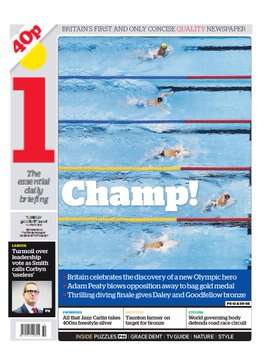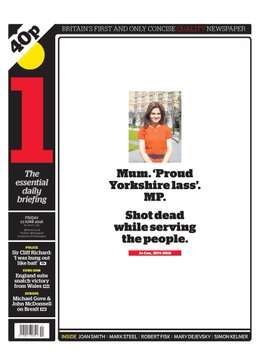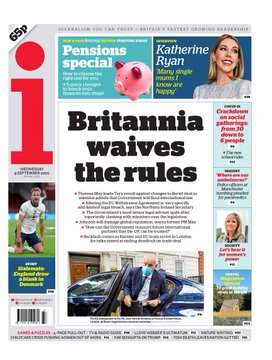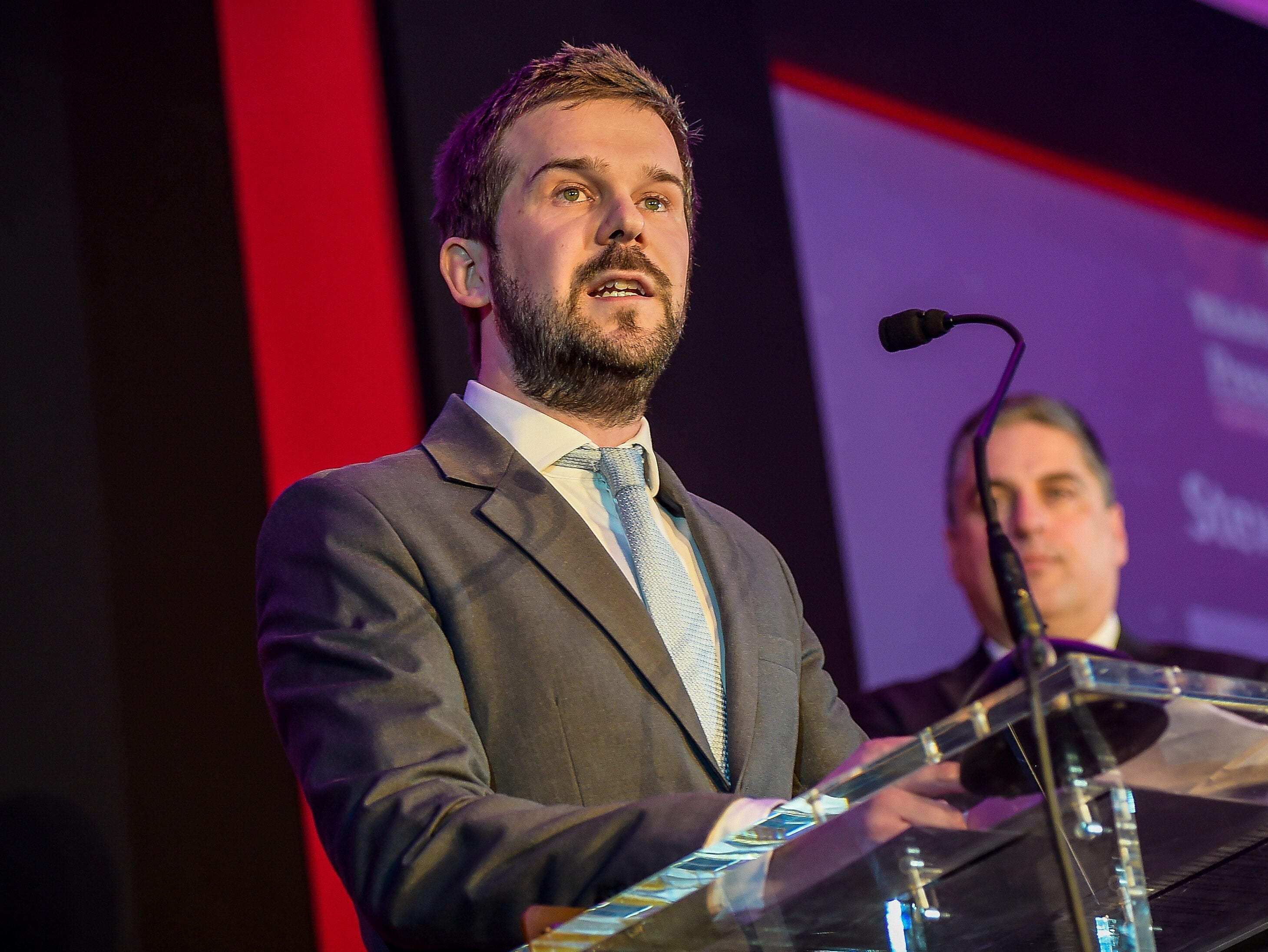
i editor Oliver Duff says it was “good that we weren’t successful too quickly” as he reflects ten years on about launching a new national daily newspaper into the UK’s already crowded market on 26 October 2010.
Duff, who was head of news on the paper’s launch and became editor in June 2013, said the slow start stopped other publishers jumping in to compete with their ready-and-waiting dummy editions.
“Had we tapped into a huge market immediately we would have faced quite a lot of competition pretty quickly,” he said.
He recalled then-owner Evgeny Lebedev and chairman Justin Byam Shaw receiving calls from other proprietors “doubting their sanity” while internal critics questioned whether it was the best way of spending their time and money.
But Duff said: “We were really lucky with the support we had from management, from the owners, who even after we failed initially [saw] the quality of the feedback we were getting from people who did buy it, passionate readers, and they underwrote a big marketing campaign a couple of months after we launched. And that was the thing that turned it around.”
The i was launched on 26 October 2010 with a staff of three as a print spin-off of The Independent and its website inews.co.uk followed only in April 2016.
The brand, which has an editorial staff of 85, now reaches 8.7m readers per month and 835,000 daily across print and online according to Pamco.
In April, at the height of the UK’s Covid-19 lockdown, it reached a peak of 18.5m unique visitors online (per Google Analytics).
And it has been consistently named as one of the most trusted newspaper brands by Pamco, drawing level with the Guardian with an 86% trust rating in April.
Duff said dialogue with readers, encouraged early on by launch editor Simon Kelner, was a major part of its success.
Originally it was expected to be a “light and fluffy” version of the Independent – but readers quickly fed back that they “wanted to be taken seriously”.
“They wanted quite a serious tone to our news coverage, tell it to us straight. It’s actually harder to get celebrity stories in the i than it was at the Independent,” Duff said.
It has ultimately worked, he said, because “it was a good idea in the first place – that mix of concise quality and brevity that’s unique, and it did tap into a gap in the market”.
“There’s lots of smart people out there who value their time and who don’t want the buyer’s remorse of wading through much thicker print products where they only get to page 22, or who don’t like the toxicity of some social media or who are bombarded with notifications, or endless streams of data and information.
“So the aim for the i has been to make us the antidote to political spin, media bias, and especially information overload.”
Building trust without being ‘bland and boring’
The paper’s political neutrality is part of the reason why it’s become so highly trusted, he went on, although he said “we try to punch hard but fair”.
“We’re not trying to sit on the fence in a bland boring way. We’re looking to have really spiky comment and analysis around it. And we want everyone to feel like they’ve had sort of an interrogation from us, so we’re going to hold the government to account for its handling of the pandemic.
“When Corbyn was Labour leader we’re going to give him a lot of scrutiny in a way that the Guardian at times found difficult to do with its readers.”
He added: “That matters, especially outside London, where 85% of i’s readers are – you see that’s especially true in Scotland for instance where a lot of the debate can be quite partisan.
“Obviously trust is hard to win. It’s easily squandered. So you have to act accordingly every day through all your journalism.
“There’s the really obvious stuff, which is especially true online but can also be true in print – like avoid clickbait, or avoid headlines that over-sell the story, tone of voice is really important. In a culture war, calm measured journalism carries weight. So avoid being shrill.
“I think conversation with your readers – that’s intrinsic to i’s DNA. They’re the people who persuaded us that the i had prospects when we floundered initially.”
Duff saw the i’s role during the Covid-19 crisis as being a “calm reassuring voice for readers who want accurate trustworthy information and analysis, and also holding the government to account”.
He said it had been satisfying to see how quickly staff adapted to a new way of working – the newsroom was empty for about two months before they returned on a rota with a quarter to a third of staff in at a time – and at the same time “upped their game” on news exclusives.
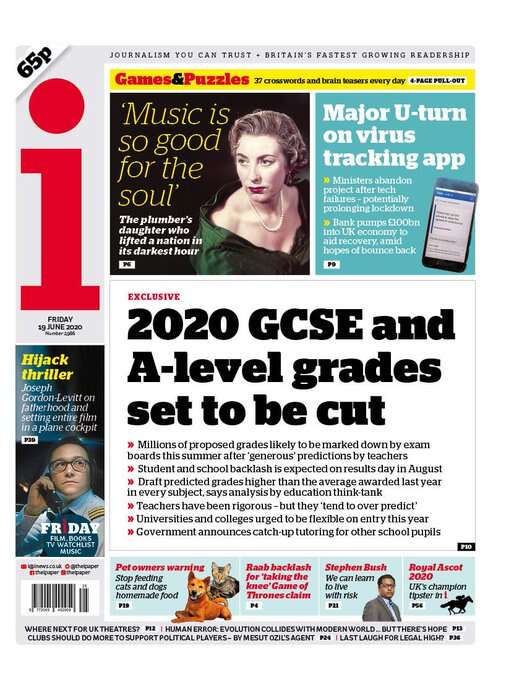 Highlights have included:
Highlights have included:
- Education correspondent Will Hazell’s exclusive predicting the A-levels marking shambles
- Jane Merrick’s exclusive on ministers considering a simplified three-tier lockdown system
- And Benjamin Butterworth’s story on the Royal Albert Hall’s impending bankruptcy.
When asked about his highlights from the past ten years, Duff cites the world exclusive on designer babies that won a British Journalism Award in 2017 for the late science journalist Steve Connor.
i’s relatively low cost-base (for a national newspaper) has ensured that it has returned healthy profits for successive owners. It was sold by ESI Media to Johnston Press for £24m in 2016 and then to Mail publisher DMGT for £49.6m in 2019.
After having four owners in four years, Duff said the title is now enjoying “great stability” within a parent company which lets “editors edit”.
It means “support from a much bigger group – everything from tech and recruitment, marketing strategy, and they have a great track record of investing in journalism as well, and believe in print with a very long-term view and share our ambitions”, Duff said.
Financial resilience
The i has been able to avoid furloughing or laying off any staff during the Covid-19 crisis along with other titles at DMGT, unlike many other publishers including the Guardian and Evening Standard.
Three-quarters of the i’s revenue comes directly from readers via newsstand sales, print subscriptions and its two apps, one which is a paper replica and the other which launched one year ago publishes online editions at 12am, 12pm and 5pm similarly to the Times.
Duff said this means the i is on a “really robust financial footing no matter what else is going on”.
“The goal has been to turn what was a disruptive start-up into a thriving, profitable, sustainable news publisher, which has bright prospects for the future,” he went on.
“We want to be an inclusive brand, a trusted brand, somewhere that advertisers are keen to come and talk to an affluent audience who are open-minded by definition – i readers are trying a new media brand, which can be quite an ingrained consumer habit certainly in print.”
No time for print ‘doom mongers’
The print title had an average circulation of 154,288 in September, down from 215,640 in early March before the UK went into lockdown.
But Duff pointed out that the i weekend, the bumper £1.20 Saturday edition that launched in 2017 under Johnston Press, has been selling as many copies in the past few weeks as it did in early March once bulks are taken out (171,528 single copies vs 169,865 in September, the latest ABC figures available).
Duff dismissed the print “doom mongers”, saying the medium will “prosper for much longer than anyone thinks, especially at the national level” and citing the “exceptional resilience and innovation” shown by publishers over the past decade.
He said that ten years ago there was “also a lot of doom mongering” but fewer solutions, whereas now a lot of different models for publisher revenue have been developed “and doing really well”, whether based on online scale or reader revenues.
“So I’m optimistic for the future in terms of the appeal of print newspapers: they are tactile, curated, finishable, there’s an element of serendipity, they’re full of surprise… and it’s community as well – a group of like-minded people who gather every day, united by their curiosity.
“Papers will continue to evolve but they will be an important part of publishers’ portfolios for a long time to come I would say… [sitting] very comfortably alongside your apps, suite of newsletters and other multimedia products.”
Lessons from the editor
Duff, who remains the youngest UK national newspaper editor at 37, shared his lessons from the last decade.
He told Press Gazette: “Learn what to stop doing, that was number one: we haven’t killed off some so-so ideas quick enough.
“Second one: never take the conversation and relationship with readers for granted. It needs constant attention, love and nurturing – and show readers the evidence that they shape your publishing.
“In six months’ time what you think now will be wrong. Don’t worry too much about that or you’ll be paralysed by indecision.
“And the last one was hire optimists. Change, innovation, transformation – they’re the default setting in our profession, so cheerful, resilient people with a can-do attitude are the difference between success, ticking along and failure.”
To mark its tenth anniversary, the i’s celebrations include a vote on some of its best front pages and a competition for children aged ten and under to design their own.
Despite being compelled to look back at the past decade to mark this milestone, Duff insisted “our default setting is to be pretty restless”.
“You have to be in our profession,” he said. “So we’re looking forward to the future rather than dwelling too much in the past.
“But we take a great deal of pride in the support we’ve had from our readers and immense gratitude to them for turning what was a young upstart into what we think is a sustainable model for quality journalism.”
Email pged@pressgazette.co.uk to point out mistakes, provide story tips or send in a letter for publication on our "Letters Page" blog

